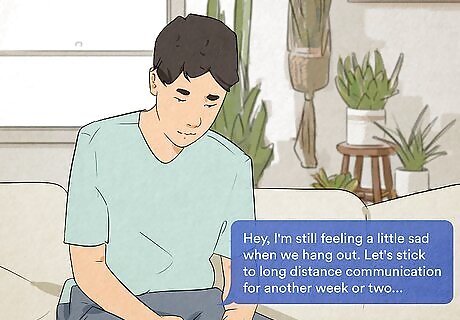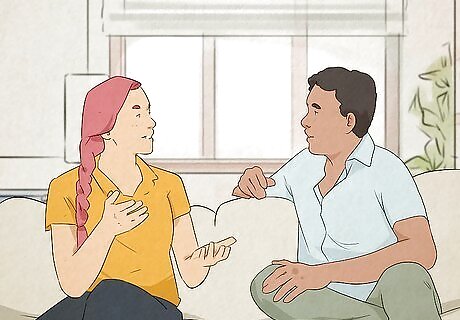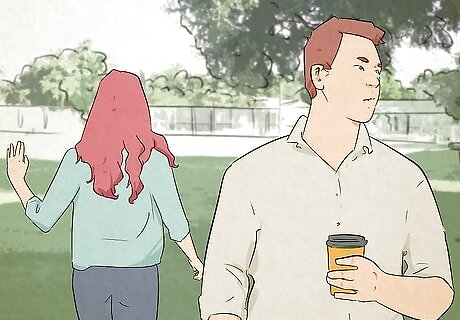
views
Establishing Boundaries

Agree to give each other space at first. For the first weeks or months after a breakup, space is key. Both of you need to properly heal and gain closure. If you try to jump straight into friendship, this is likely to backfire as you'll both be too emotional. Agree to a set period of time to cease or minimize contact so feelings of attraction, romance, and resentment can fade. How much time you give is subjective. Some people may be ready for friendship in a few weeks, while others may need a few months. How much time you spent in the relationship will have an effect; longer relationships typically require longer periods of limited contact. Reader Poll: We asked 522 wikiHow readers who've broken up with their partner, and only 5% of them agreed that you should prioritize staying friends [Take Poll] immediately after a breakup. Giving each other some space is the best way to avoid causing more confusion and pain.

Wait until there's no unfinished business to pursue a friendship. The reason it can be difficult to stay friends with an ex is that people feel the relationship is not finished. If you find yourself feeling you have more to say, or still need closure, it's not the right time to be friends. Wait until you feel at peace with the breakup to pursue a friendship. If you need to talk about a few more things before you can be friends, have a discussion with your ex about any loose ends a few weeks after you break up. Be sure to tie up practical loose ends. If you shared belongings or lived together, wait until your lives are completely separate before pursuing a friendship.

Recognize your feelings. Boundaries are important to any relationship, especially complicated ones. Recognizing your own feelings and limitations is key to establishing firm boundaries with an ex. Spend some time thinking over how your ex makes you feel and what kind of contact you're comfortable with. Ask yourself what kind of contact makes you feel bad. Maybe you don't like discussing your ex's new relationships. Maybe you don't like that your ex still calls you by your pet name. It's always okay to request someone stop or tone down behaviors that bother you.

Talk openly about boundaries. If you are interested in establishing a friendship, it is essential to have clear expectations of each other in these new roles in each other’s lives and create boundaries. Find a good time and place to have a calm, sit down talk about your boundaries in regards to a friendship. Let your ex know directly what kind of contact is still appropriate and let them share their feelings as well. State your boundaries outright so there's no ambiguity. For example: "I'll eventually be fine with hearing about your romantic life, but I really need space from that right now. Let's not talk about dating together."

Care for yourself. Setting boundaries after a breakup can hurt, even if it's for the best. Recognizing contact will be more minimal and that certain topics are off limits can sting. After setting boundaries, do something nice for yourself. Go for a walk, watch a movie, or make plans with friends. Doing something nice for yourself may take your mind off of the break up and help you distance yourself from the subject. In turn, this may help you recover sooner.
Coping Emotionally

Let go of the hopes you have for a relationship. Remind yourself the relationship is over. One of the major downsides of staying friends with an ex is that it can sometimes keep the hope of a relationship alive. Remember, you are exes for a reason and you need to let go of any dreams you had for the relationship. If you find yourself fantasizing about your future together, stop. Think to yourself, "We're not together anymore, and that isn't going to happen." Replace your hopes for a romantic relationship with hopes for a friendship. Think about how you can support each other as friends instead of as romantic partners.

Embrace your differences. Fundamentally different world views or different lifestyles can cause a breakup. Now that you're just friends, you can appreciate these differences more. Now you're free to embrace the positives of having a friend who's different from you instead of worrying about your romantic compatibility. For example, a friend who likes to sleep with the fan on probably won't affect a friendship, but it could affect a romantic relationship, especially if you live together.

Call it off if you're feeling bad. It's okay to take a step back sometimes. Stay aware of your feelings as you pursue a friendship. If things feel strained and you feel sad or drained when hanging out, it's okay to slow things down. Be open about this. Say something like, "Hey, I'm still feeling a little sad when we hang out. Let's stick to long distance communication for another week or two." Respect your ex's feelings. If they're struggling with the idea of staying friends, respect any requests they make for space.

Manage feelings of lingering attraction. It's normal to still feel attracted to someone after a breakup, but don't try to feed into these feelings. It's hard to stay just friends if you're still having sex or being physically intimate. Some exes are able to maintain a physical relationship, or be friends with benefits, after a period of time. However, it's often a bad idea to pursue lingering attraction in the direct aftermath of a relationship. If you decide to get physical again in the future, have a very clear talk about what this means for your relationship.
Maintaining the Friendship

Stay respectful of one another. Boundaries are key to any friendship and are often more important with delicate relationships. You and your ex need to stay respectful of each other's boundaries over time. Make sure you're not breaking any rules in regards to contact, and let your ex know what you need from them. Boundaries change over time, so let your ex know right away if you're more or less comfortable with something. For example, say something like, "I know I didn't want to discuss your dating life at first, but I feel more comfortable with that now. I'd be fine if you wanted to talk about it."

Get family members and friends on board. It's easier to be friends with an ex if your own friends and family are on board, especially mutual friends. Let people know that the two of you are still friends and it's okay to invite you to the same events. Make sure people know there is no need to feel weird or uncomfortable when you and your ex are in the same room. Be open about boundaries with friends and family members. For example, say something like, "I'm okay being friends with my ex, but I'm not ready to meet their new partner. I'd appreciate not being invited to events their partner is attending."

Make sure new partners are comfortable with the friendship. A new romantic relationship can complicate your relationship with your ex. Let your partner know that you and your ex used to date. Make sure your partner understands the relationship is over and the two of you are just friends now. Your partner may sometimes need extra reassurance or comfort after you hang out with your ex, so make sure to give them that as needed.

End the friendship if you're unable to manage your emotions. If you find the relationship is not working, it's okay to walk away. You may find you and your ex argue when you get together. You may be the one putting in all the effort while your ex is ignoring you. If the relationship is simply draining, it's okay to let it go. Not everyone can stay friends with their ex.



















Comments
0 comment